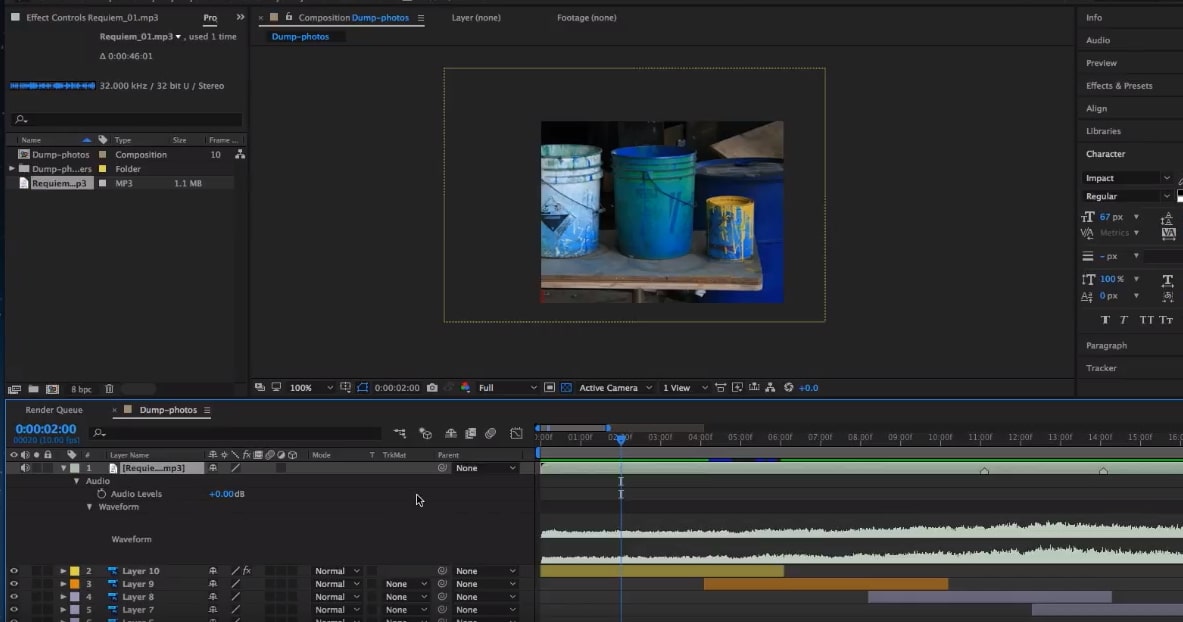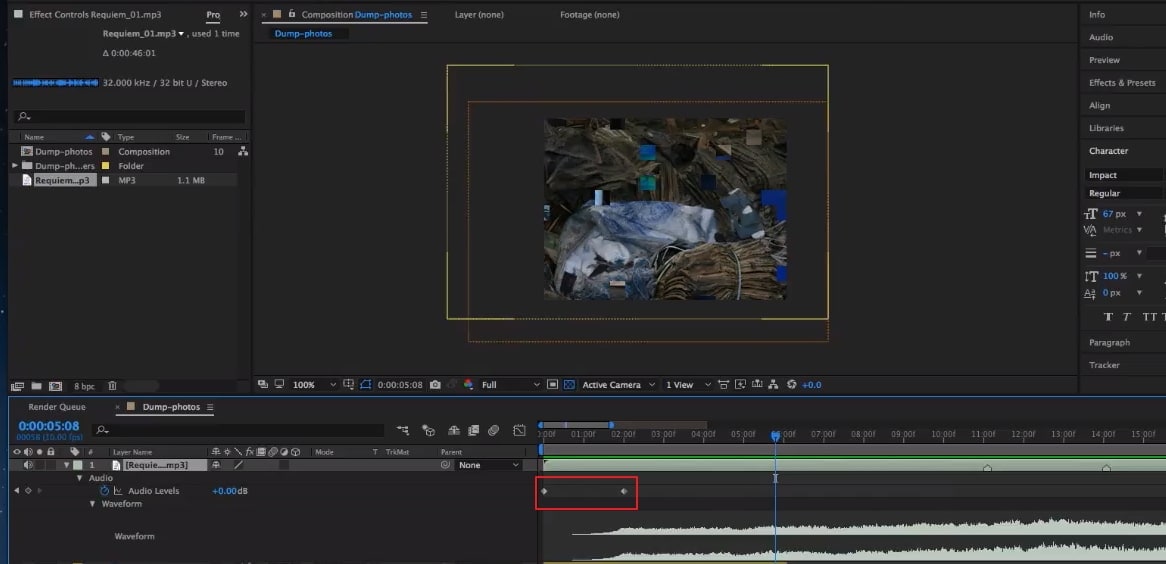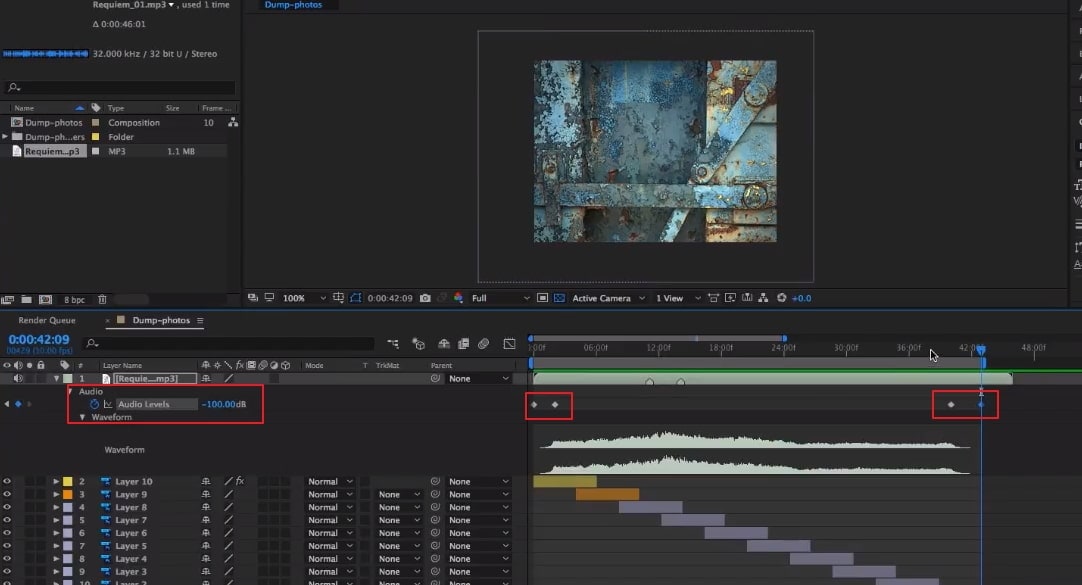- After Effects Tutorial
How to Fade In and Fade Out Audio in Adobe After Effects
Nov 02,2019• Proven solutions
The first association many of us get, when Adobe After Effects is mentioned, are stunning motion graphics and breathtaking visual effect. Very few people think of audio editing when they talk about AE, even though this application offers a simple way to add fade in and fade out effects to audio files that are used in soundtracks.
However, you will need to have at least basic video and sound editing skills in order to be able to fade in and fade out audio files in AE, since the app doesn’t offer a preset that you can just drag and drop to the timeline. So, in this article, we are going to show how to create the fade in and fade out effects in Adobe After Effects in just a few simple steps.
Read More to Get : Best Audio Mixer Software to Trim Your Sound Easily >>
Adding the Fade In and Fade Out Effects to Audio Files in AE
Step 1: Check aduio waveform in After Effects
Once you’ve created a new project in AE, and you’ve imported the audio files you’d like to include in the soundtrack of the video you’re making, you should simply place that audio file on the timeline. The file you added to your composition will be displayed as a layer in the Composition tab that is located in the lower left region of the software’s interface. Click on the arrow that is located next to the audio file, then click on the Audio arrow that is going to be displayed under the file, and finally click on the Waveform arrow. This will enable you to see the waveform of the audio file you’d like to edit on the timeline and allow you to add fade in and fade out effects with more precision.

Step 2: Add keyframe to audio file
The next thing you will have to do is place the playhead at the exact location where you want the Fade In effect to start. In most cases, fade in effects are added at the starting point of the audio file, so you should position the playhead at the beginning of the timeline, or at zero seconds. You will be able to see a stopwatch next to the Audio Levels option that is located in the Composition tab, simply click on it to add the first keyframe and proceed to assign a negative value to the Audio Level setting. -100db or -50db values are going to make the audio file silent, and you can pick either based on how long you want the fade in effect to last. If you don't know how to use keyframes in After Effects, this article will give you some info.

You may also like: 15 Free After Effects Templates to Power up Your Video
Step 3: Complete fade out/in audio in After Effects
Move the playhead to the location where you want the effect to end and add another keyframe by clicking on the ‘Add or remove keyframe at current time’ icon. Set the Audio Level value to 0db, and that is it, you’ve created the fade in effect. Keep in mind that you can use more than two keframes to fade in audio, which enables you to increase the audio level more gradually. The process of creating the fade out effect requires you to add a keyframe that has a 0db value a few seconds before the clip ends, and then add another keyframe at the very end of the audio file that has -50 or -100db audio level value.

Tips For Making Better Fade In and Fade Out Effects
The process of creating a fade in or a fade out effects in AE is quite simple, but it is up to you to discover creative ways of using these effects. Here are a few tips that can help you use these audio effects more creatively.
1. Avoid Hard Cuts
A high pitch sound at the very begging of a new sequence can ruin your soundtrack and ultimately the entire video, so in case you’ve made a cut in an audio file at the location where the sound peaks, you can apply a fade in effect to make the transition between two audio files softer.
You may also like: How to Cut Video in After Effects
2. Be Mindful of Audio Compression
Audio compression is a process that reduces loud sounds and amplifies quiet sounds, so as a result of the audio file’s dynamic range is compressed. In most cases, you won’t be able to notice the effects of audio compression, but if you compress an audio file too much, you might get some unwanted side effects if you add a fade out effect to that file. That’s why it is best to rely on the default audio compression features a video or audio editing app offers.
3. Use the Fade In and Fade Out Effects Creatively
Besides opening and closing scenes, you can also use the fade in and fade out effects to mix two different tracks while the shot is still in progress. Simply fade out one track and make it look like a scene is ending and then introduce a new theme that changes the mood of that scene. The important thing is to avoid reducing the audio level all the way to -100db because you might end up creating a silence in a scene that disrupts the flow of an entire video.
Conclusion
Fading in or fading out audio files in Adobe After Effects doesn’t require much effort, as you just have to add a few keyframes to the file and adjust the Audio Level value. However, finding the best way to improve the quality of your soundtrack by applying these effects may take some practice. Do you often add fade in and fade out audio effects in AE? Leave a comment below and share your experiences with us.
If you want to make fade in/out aduio easily, we recommend using FilmoraPro. It is designed for people want to edit professional video with simple to use features. Besides fade in/out audio in FilmoraPro, you can also automatically sync audio to video. Download it now to have a try (free)!
Bring up your video to a professional level with straightforward tools.
Try It Free Try It Free






Liza Brown
chief Editor
0 Comment(s)